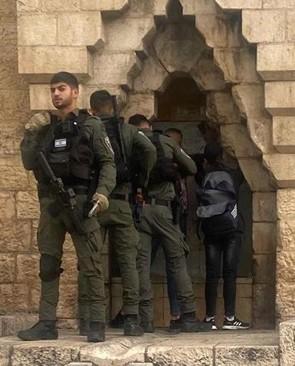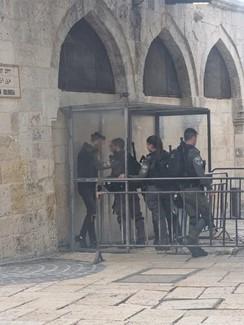The soldiers had hissed at him like he was an animal...

Who remembers what it was like during exam week in high school? It can be a stressful time for anyone.
But imagine if part of the ritual of going to class involved being pulled aside by heavily armed soldiers in order to be body searched, have your bag checked, wait for 10‒15 minutes while your ID is scanned, and detained until the soldiers decide you can go. Would that elevate your stress levels at all? Well, if you’re a male Palestinian teen, maybe or maybe not because you’ve been doing this all year on your way to school.
Sadly, this is a way of life for Palestinian youth. And from what I saw, I thought they demonstrated remarkable restraint, although it would be difficult to show anything else when you are surrounded by soldiers who have their weapons trained on you. I try to imagine what I would have been like at that age if I received regular harassment by the authorities on my way to school. I suspect I would have had something to say, although I’m sure these boys know that any poorly chosen words could have dire consequences.
On one occasion we watched a 17-year-old, whom I’ll call Mohammed to protect his identity, being searched—the usual bag check, body search, lift your T-shirt, and ID check. After about a 10‒15 minute wait, he asked if he could have his ID back. The soldiers hissed at him, while one grabbed him by the throat and another had their weapon at the ready. A couple of minutes after Mohammed’s complaint and a brief scuffle, he was allowed to go.
We caught up to him and spoke with him using a shopkeeper as a translator. What seemed to upset Mohammed the most was not the body search or the hand on his throat but rather that the soldiers had hissed at him like he was an animal—refusing to acknowledge his humanity. This was a sentiment we encountered at checkpoints where Palestinians complained about being treated like animals.

The presence of Ecumenical Accompaniers (EAs) is overwhelmingly supported by Palestinian students, their parents, and school staff. As for the Israeli soldiers, there are different reactions. On one occasion I had a soldier scream at me, asking why I was taking pictures while they were “questioning a suspect.” It doesn’t seem to take much to be a suspect if you’re Palestinian. My colleague pointed out that this was the Via Dolorosa and a common place to take pictures. The soldier bellowed that this was not the Via Dolorosa, even though we were about 10 metres away from two road signs indicating “Via Dolorosa.” On another occasion, a soldier approached my colleague and indicated that in the “interest of child protection” she needed permission before she could take pictures of them abusing children. The child couldn’t speak English, so my colleague pointed to her EAPPI vest and then to her phone, asking for a thumbs up or thumbs down. She received two thumbs up and a big thank you after the ordeal was over.
As bad as things often are for Palestinian students, surveys of students, their parents, and school staff all agree that they feel the students are safer with international observers.
—Bill Chambre is a member of St. Andrew’s United Church, Halifax, who served as an Ecumenical Accompanier in the West Bank. The World Council of Churches’ Ecumenical Accompaniment Programme in Palestine and Israel (EAPPI) is an initiative under the WCC’s Ecumenical Campaign to End the Illegal Occupation of Palestine: Support a Just Peace in the Middle East. Its mission is to accompany churches in Israel and the Occupied Palestinian Territories in their non-violent actions and concerted advocacy efforts to end the occupation and support a just peace in the Middle East.
The views contained within these blogs are personal and do not necessarily reflect those of The United Church of Canada.